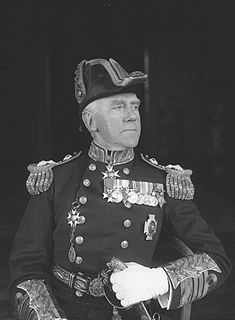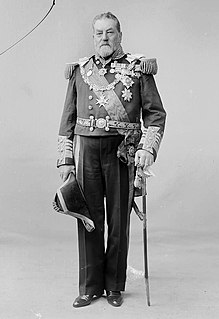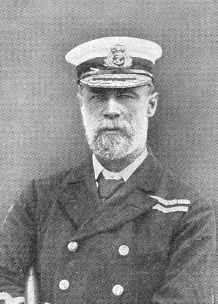 W
WAdmiral Frederick Beauchamp Paget Seymour, 1st Baron Alcester, was a British naval commander. He was Commander-in-Chief of the Channel Fleet between 1874 and 1877 and of the Mediterranean Fleet between 1880 and 1883.
 W
WAdmiral Sir Lewis Bayly, was a Royal Navy officer who served during the First World War.
 W
WCharles William de la Poer Beresford, 1st Baron Beresford,, styled Lord Charles Beresford between 1859 and 1916, was a British admiral and Member of Parliament.
 W
WAdmiral Sir Edward Eden Bradford, was a British naval officer, who commanded the 3rd Battle Squadron of the Grand Fleet until May 1916, and wrote Admiral of the Fleet Arthur Knyvet Wilson's biography.
 W
WAdmiral Sir Montague Edward Browning, was a senior Royal Navy officer who served as Second Sea Lord and Chief of Naval Personnel.
 W
WAdmiral Sir Henry Harvey Bruce KCB MVO was a British Royal Navy officer.
 W
WAdmiral of the Fleet Sir Cecil Burney, 1st Baronet, was a Royal Navy officer. After seeing action as a junior office in naval brigades during both the Anglo-Egyptian War and the Mahdist War, he commanded a cruiser in operational service during the Second Boer War. As a flag officer he commanded the Plymouth Division of the Home Fleet, the 5th Cruiser Squadron, the Atlantic Fleet and then the 3rd Battle Squadron.
 W
WAdmiral Sir Sackville Hamilton Carden was a senior Royal Navy officer of the late nineteenth and early twentieth centuries. In cooperation with the French Navy, he commanded British naval forces in the Mediterranean Sea during the First World War.
 W
WAdmiral Sir Stanley Cecil James Colville, was a senior Royal Navy officer.
 W
WAdmiral Sir Dudley Rawson Stratford de Chair was a senior Royal Navy officer and later Governor of New South Wales.
 W
WRear Admiral Sir Sydney Marow Eardley-Wilmot was a Royal Navy officer who took an active part in the Suakin Expedition and who lost a hand as the result of an explosion at the torpedo school HMS Vernon. He had a specialism in naval gunnery and was Superintendent of Ordnance Stores at the Admiralty during the period of the Anglo-German naval arms race when the Dreadnought Fleet was developed. He advocated for the construction of the largest guns possible. He wrote a number of works of naval history as well as two books about future naval warfare.
 W
WJohn Arbuthnot Fisher, 1st Baron Fisher,, commonly known as Jacky or Jackie Fisher, was a British Admiral of the Fleet known for his efforts at naval reform. He had a huge influence on the Royal Navy in a career spanning more than 60 years, starting in a navy of wooden sailing ships armed with muzzle-loading cannon and ending in one of steel-hulled battlecruisers, submarines and the first aircraft carriers.
 W
WIsrael Harding VC was an English recipient of the Victoria Cross, the highest and most prestigious award for gallantry in the face of the enemy that can be awarded to British and Commonwealth forces.
 W
WAdmiral Sir Anthony Hiley Hoskins, was a Royal Navy officer. As a junior officer, he took part in the Cape Frontier War of 1851 and then saw action at the Battle of Canton in December 1857 and the Battle of Taku Forts in May 1858 during Second Opium War. Once promoted to flag officer rank, he acted as Second-in-Command of the Fleet at the bombardment of Alexandria in July 1882 during the Anglo-Egyptian War. He went on to be First Naval Lord in September 1891 but in that role took a relaxed view of the size of the Fleet and did not see the need for a large shipbuilding effort on the scale envisaged by some of his colleagues, such as Admiral Sir Frederick Richards and Admiral Sir John Fisher who were concerned about French and German naval expansion.
 W
WAdmiral of the Fleet Sir Charles Frederick Hotham was a Royal Navy officer. As a junior officer, he was a member of the naval brigade that fought the Māori people at the Battle of Rangiriri during the invasion of the Waikato and was also present at the Battle of Gate Pā during the Tauranga Campaign. He later took part in the bombardment of Alexandria during the Anglo-Egyptian War and then went ashore as Chief of Staff of the naval brigade, formed under Admiral Sir Beauchamp Seymour, which was dispatched to restore the authority of Khedive Tewfik Pasha in the face of Ahmed ‘Urabi's nationalist uprising against the administration.
 W
WAdmiral of the Fleet John Rushworth Jellicoe, 1st Earl Jellicoe, was a Royal Navy officer. He fought in the Anglo-Egyptian War and the Boxer Rebellion and commanded the Grand Fleet at the Battle of Jutland in May 1916 during the First World War. His handling of the fleet at that battle was controversial. Jellicoe made no serious mistakes and the German High Seas Fleet retreated to port, at a time when defeat would have been catastrophic for Britain, but the public was disappointed that the Royal Navy had not won a more dramatic victory given that they outnumbered the enemy. Jellicoe later served as First Sea Lord, overseeing the expansion of the Naval Staff at the Admiralty and the introduction of convoys, but was relieved at the end of 1917. He also served as the Governor-General of New Zealand in the early 1920s.
 W
WAdmiral Sir Henry Coey Kane was a Royal Navy officer.
 W
WAdmiral of the Fleet Louis Alexander Mountbatten, 1st Marquess of Milford Haven,, formerly Prince Louis Alexander of Battenberg, was a British naval officer and German prince related to the British royal family.
 W
WAdmiral of the Fleet The Honourable Sir Hedworth Meux was a Royal Navy officer. As a junior officer he was present at the bombardment of Alexandria during the Anglo-Egyptian War.
 W
WAdmiral Sir Robert John Prendergast KCB was a Royal Navy officer.
 W
WAdmiral Sir Harry Holdsworth Rawson, was a senior officer in the Royal Navy. He is chiefly remembered for overseeing the Benin Expedition of 1897, a British punitive expedition against the Kingdom of Benin. Rawson's force looted and burned the palace, exiled the Oba, and confiscated a large number of the Benin Bronzes and other royal treasures. Rawson was appointed Governor of New South Wales, serving from 27 May 1902 to 27 May 1909.
 W
WAdmiral Sir Percy Moreton Scott, 1st Baronet, was a British Royal Navy officer and a pioneer in modern naval gunnery. During his career he proved to be an engineer and problem solver of some considerable foresight, ingenuity and tenacity. He did not, however, endear himself to the Navy establishment for his regular outspoken criticism of the Navy's conservatism and resistance to change and this undoubtedly slowed the acceptance of his most important ideas, notably the introduction of directed firing. In spite of this, his vision proved correct most of the time and he rose to the rank of admiral and amongst other honours was made baronet, a hereditary title.
 W
WSir Mansfield George Smith-Cumming was a British naval officer and the first director of the Secret Intelligence Service (SIS).
 W
WAdmiral of the Fleet Sir Frederick Charles Doveton Sturdee, 1st Baronet was a Royal Navy officer. After training as a torpedo officer, he commanded two different cruisers and then three different battleships before becoming commander of the 1st Battle Squadron of the Home Fleet. He went on to command the 3rd Cruiser Squadron and then the 2nd Cruiser Squadron.
 W
WRear Admiral Sir Charles Lionel Vaughan-Lee, was a senior Royal Navy officer in the early 20th century. He served during World War I, rising to the rank of rear-admiral.
 W
WAdmiral of the Fleet Sir Arthur Knyvet Wilson, 3rd Baronet was a Royal Navy officer. He served in the Anglo-Egyptian War and then the Mahdist War being awarded the Victoria Cross during the Battle of El Teb in February 1884. He went on to command a battleship, the torpedo school HMS Vernon and then another battleship before taking charge of the Experimental Torpedo Squadron. He later commanded the Channel Fleet. He briefly served as First Sea Lord but in that role he "was abrasive, inarticulate, and autocratic" and was really only selected as Admiral Fisher's successor because he was a supporter of Fisher's reforms. Wilson survived for even less time than was intended by the stop-gap nature of his appointment because of his opposition to the establishment of a Naval Staff. Appointed an advisor at the start of World War I, he advocated offensive schemes in the North Sea including the capture of Heligoland and was an early proponent of the development and use of submarines in the Royal Navy.
 W
WSir Robert Bourchier Sherard Wrey, 11th Baronet DL JP of Tawstock Court, North Devon, was a prominent member of the Devonshire gentry.